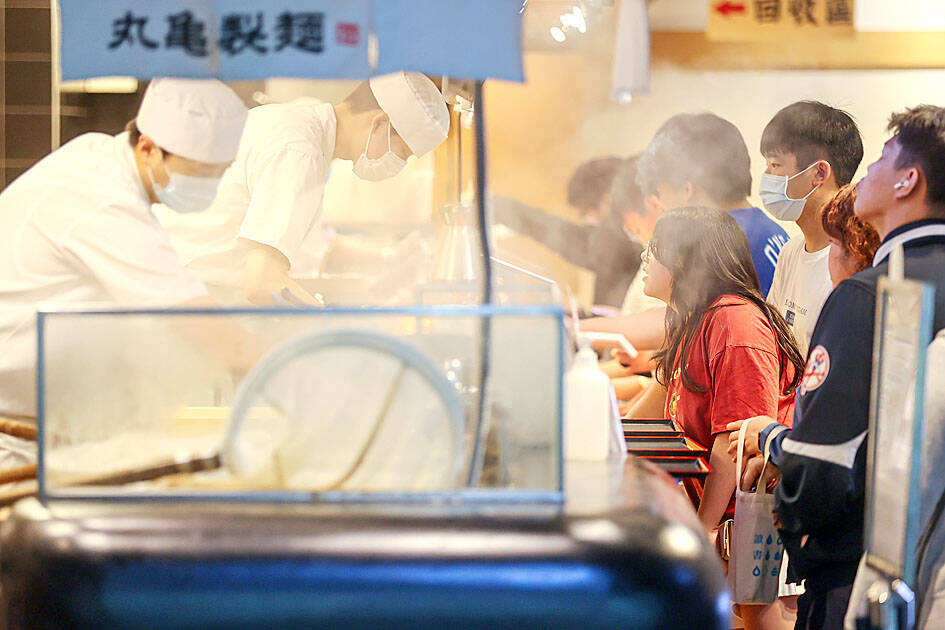Sales in the retail, and food and beverage sectors last month increased 1.6 percent and 0.7 percent respectively from a year earlier, decelerating from rises of 1.9 percent and 10.5 percent the previous month, the Ministry of Economic Affairs said yesterday.
Wholesale sector sales last month grew by 16.2 percent annually, accelerating from a 4.1 percent increase in March, mainly due to strong demand for artificial intelligence (AI) and high-performance computing (HPC) technologies, an increase in non-tech goods exports and inventory restocking ahead of Mother’s Day, the ministry said in a report.
Retail, and food and beverage sales this month would continue to increase year-on-year, benefiting from Mother’s Day promotions, seasonal demand for iced beverages and home appliances, and the launch of new vehicle models, the ministry said.

Photo: CNA
The ministry also said it expects wholesale sector sales to grow on an annual basis for the third month in a row, given rising uptake of AI and HPC applications, coupled with restocking demand in preparation for new business opportunities.
Last month, retail sector sales were NT$387.2 billion (US$12.01 billion), the highest April sales, driven mainly by higher consumption at supermarkets and convenience stores, e-commerce sites, cosmetics outlets, automobile vendors and information technology and consumer electronics stores, despite slowing sales at department stores, hypermarket outlets and apparel shops, the report said.
In the first four months of this year, retail sales totaled NT$1.57 trillion, up 3.2 percent from a year earlier, and are expected to grow up to 2.5 percent annually to between NT$389.6 billion and NT$401.3 billion, the ministry said.
Sales in the food and beverage sector reached NT$80 billion last month, as growth in in-flight meals supported catering services and Tomb Sweeping Day increased family gatherings, even though several food safety incidents affected restaurant sales, the report said.
In the first four months, food and beverage sales rose 5 percent year-on-year to NT$344.1 billion, the ministry said, forecasting sales this month would grow 4.5 to 7.5 percent annually to between NT$85.2 billion and NT$87.6 billion.
Wholesale sector sales were NT$1.06 trillion last month on the back of strong demand for machinery equipment, chemical materials, food and tobacco products, and medicines and cosmetics, the report said.
Cumulative sales in the first four months grew 9.5 percent to NT$4.1 trillion, and would rise by 10 to 13 percent annually this month to between NT$1.05 trillion and NT$1.07 trillion, the ministry said.

Nvidia Corp CEO Jensen Huang (黃仁勳) is expected to miss the inauguration of US president-elect Donald Trump on Monday, bucking a trend among high-profile US technology leaders. Huang is visiting East Asia this week, as he typically does around the time of the Lunar New Year, a person familiar with the situation said. He has never previously attended a US presidential inauguration, said the person, who asked not to be identified, because the plans have not been announced. That makes Nvidia an exception among the most valuable technology companies, most of which are sending cofounders or CEOs to the event. That includes

TARIFF TRADE-OFF: Machinery exports to China dropped after Beijing ended its tariff reductions in June, while potential new tariffs fueled ‘front-loaded’ orders to the US The nation’s machinery exports to the US amounted to US$7.19 billion last year, surpassing the US$6.86 billion to China to become the largest export destination for the local machinery industry, the Taiwan Association of Machinery Industry (TAMI, 台灣機械公會) said in a report on Jan. 10. It came as some manufacturers brought forward or “front-loaded” US-bound shipments as required by customers ahead of potential tariffs imposed by the new US administration, the association said. During his campaign, US president-elect Donald Trump threatened tariffs of as high as 60 percent on Chinese goods and 10 percent to 20 percent on imports from other countries.

Taiwanese manufacturers have a chance to play a key role in the humanoid robot supply chain, Tongtai Machine and Tool Co (東台精機) chairman Yen Jui-hsiung (嚴瑞雄) said yesterday. That is because Taiwanese companies are capable of making key parts needed for humanoid robots to move, such as harmonic drives and planetary gearboxes, Yen said. This ability to produce these key elements could help Taiwanese manufacturers “become part of the US supply chain,” he added. Yen made the remarks a day after Nvidia Corp cofounder and chief executive officer Jensen Huang (黃仁勳) said his company and Taiwan Semiconductor Manufacturing Co (TSMC, 台積電) are jointly

MARKET SHIFTS: Exports to the US soared more than 120 percent to almost one quarter, while ASEAN has steadily increased to 18.5 percent on rising tech sales The proportion of Taiwan’s exports directed to China, including Hong Kong, declined by more than 12 percentage points last year compared with its peak in 2020, the Ministry of Finance said on Thursday last week. The decrease reflects the ongoing restructuring of global supply chains, driven by escalating trade tensions between Beijing and Washington. Data compiled by the ministry showed China and Hong Kong accounted for 31.7 percent of Taiwan’s total outbound sales last year, a drop of 12.2 percentage points from a high of 43.9 percent in 2020. In addition to increasing trade conflicts between China and the US, the ministry said